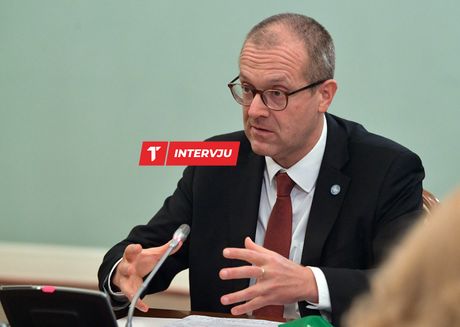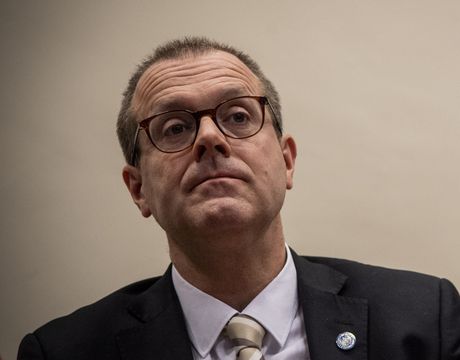WHO Europe chief Hans Kluge for Telegraf: Why lessons weren't learned, will Christmas be "canceled"?

Europe is preparing for another pandemic winter. Because of the increase in the number of new cases and deaths from coronavirus, many European countries are resorting to harsh measures - they are introducing lockdowns for the unvaccinated, curfews and mandatory vaccination. Dr. Hans Kluge, regional director of the World Health Organization for Europe, speaks exclusively for Telegraf.rs about why Europe has not learned its lessons and what we can expect in the coming months.
- Coronavirus cases and deaths continue to rise in Europe almost two years after the beginning of the pandemic. Why do you think that is happening and what can we do to stop that?
The European Region is once again at the epicentre of the pandemic; we’re seeing a rapid rise in cases, hospitalisation and deaths. There are three reasons for this. First, the highly transmissible Delta variant which is dominant in the Region, and second, there are still many people susceptible to SARS-CoV-2 such as the unvaccinated and those with waning immunity, and third, we’re mixing more and because of the colder weather we’re spending more time gathering indoors.
One reliable projection estimates we could see nearly half a million more deaths in the European Region by February 1st.
In terms of curbing severe disease and death, it’s vitally important that we drive up vaccination rates in the priority groups such as the elderly and immunocompromised.
Vaccination rates vary massively across the region and that means too many people are still vulnerable to the severe consequences of the virus. And we know that it is the unvaccinated vulnerable groups who make up most people in hospital needing critical care in most countries.
The most urgent priority is making sure these groups get vaccinated, and that other non-pharmaceutical measures are put in place – physical distancing, masking, and regular hand hygiene – to drive down transmission of the virus so that health systems don’t buckle under the strain.
We're in a much more positive position than we were this time last year, even though there is still a long way to go before the pandemic ends. We’re increasingly learning to live with the virus and we’re actively managing the pandemic.
More than half of people in the European Region have completed their dose series. That’s a remarkable achievement in less than a year of the vaccination program and it has prevented many hospitalizations and saved hundreds of thousands of lives, and it will continue to do so.
- What lessons should we have learned by now, and why didn't we?
COVID-19 was a massive shock to our health systems and to society at large. We were simply not ready for a pandemic, and this lack of preparedness caused untold misery in our communities. Specifically, in the Western Balkans, COVID-19 exposed four areas which need renewed investment and attention: primary health care, health & social protection, governance, and digital health technologies.
I am committed to the Western Balkans Roadmap for Health & Wellbeing, with the overarching aim of closing the health gaps between the Western Balkans and the European Union. WHO/Europe will support the region with policies and measures to increase life expectancy and health literacy, decrease child and maternal mortality, expand access to universal health coverage, and train health workers.

In order to meet our ambitious goals, it’s vital we strengthen the multilateral system – which is under attack – and the pandemic has only made matters worse. This means strengthening WHO, giving it more authority to hold Member States accountable for their actions or inactions. It’s also vital for WHO to be seen as a trusted partner that is able to bring scientists and policymakers together as a convener, to help address the health challenges of today and tomorrow.
It is necessary to enhance the position of health policy in overall policy making by governments and international organizations, by setting up a Global Health and Finance Board at the G20, recognizing that health is a global public good. High on the agenda at the World Health Assembly taking place right now in Geneva is the creation of a WHO convention on pandemic preparedness and response, so we are better prepared for the health emergencies of tomorrow. New generations deserve a better world; one where progress does not come at the expense of their health and the health of the planet.
This requires close cross-border collaboration and perhaps most vital, compromise. Good science should always be rooted in data and evidence but also underpinned by a constant dialogue.
If COVID-19 taught us one thing, it was that no single country got everything right and no single country will end this pandemic alone. The pandemic will ONLY end when we respond to the crisis as if there were no borders.
Going forward, I would like to convey one overarching message: health is wealth, and without health, there is no wealth. COVID-19 has made crystal clear the deep links between health and the economy. No health, no growth. If we invest in the health of our people now, we are investing in the future of our economies.
- Do you think Europe will have to cancel Christmas again this year, and what is your prognosis for the next three months? Can we expect new variants?
I don’t believe Christmas will be ‘cancelled’ this year, and that’s because we know so much more about this virus than we did this time last year.
If we follow the science, get vaccinated, and continue to take precautions in closed or crowded spaces, we can enjoy the holiday period with friends and family.
It’s been a tough year for many people, and it’s important for our mental health and well-being to celebrate with loved ones.
So, my message this festive period is to enjoy yourself, but manage your risk and remain vigilant. This means taking precautions – number one, make sure you are vaccinated if eligible, and also clean hands regularly, avoid crowded places, keep a distance from others, wear a mask where appropriate, ventilate indoor spaces, sneeze and cough into you elbow – these are the preventive measures that we know work.
The European Region is looking at the prospect of a difficult winter ahead. Our region is the only WHO region to have recorded an increase in COVID-19 cases over the past few weeks. The situation is especially challenging in several countries in Eastern and Central Europe. Now is NOT the time to let our guard down as the pandemic is far from over.
New variants are always a possibility. For example, WHO is currently analyzing at least 30 different strains of the Delta variant now dominant in the European Region. So far, there is no cause for concern, and we continue to monitor the emergence of new variants. More transmission means more opportunities for new variants to emerge. So we have to drive transmission levels down, to put pressure on the virus and prevent it from mutating.
- What do you think about the lockdown for the unvaccinated in Austria, and do you think other countries should follow their example?
Many countries are seeing an increase in cases, and especially in the northern hemisphere countries are looking for ways to reduce the spread of COVID-19 during winter.
Countries need to follow a risk-based approach to curbing transmission, based on assessment of their own national epidemiological situations.
Implementing a lockdown should always be a measure of last resort and implementing one on a specific group and not others within a population has human rights and welfare implications (particularly on the health and livelihoods of those affected) which governments must assess.
If vaccination is a criterion for entry/movement, consideration should be given to people who are medically exempt or have not been able to have the vaccine.
Governments should continue to make every effort to ensure vaccination is available and accessible to all eligible individuals, especially those in priority groups as identified by the national programme.
Every individual has a role to play in bringing cases of COVID-19 down. In areas where the virus is circulating, everyone should continue to wear a mask especially in closed, confined and crowded spaces, keep a distance, open windows when you are indoors, cover coughs and sneezes, wash hands regularly and get vaccinated as soon as it’s your turn.
We know these measures are effective and with the circulation of more transmissible variants it is even more critical to keep following them and not let our guard down.
Video: How to fill out the EU green certificate form on the eUprava portal
(Telegraf.rs)
Video: Požar Sremčica
Telegraf.rs zadržava sva prava nad sadržajem. Za preuzimanje sadržaja pogledajte uputstva na stranici Uslovi korišćenja.

